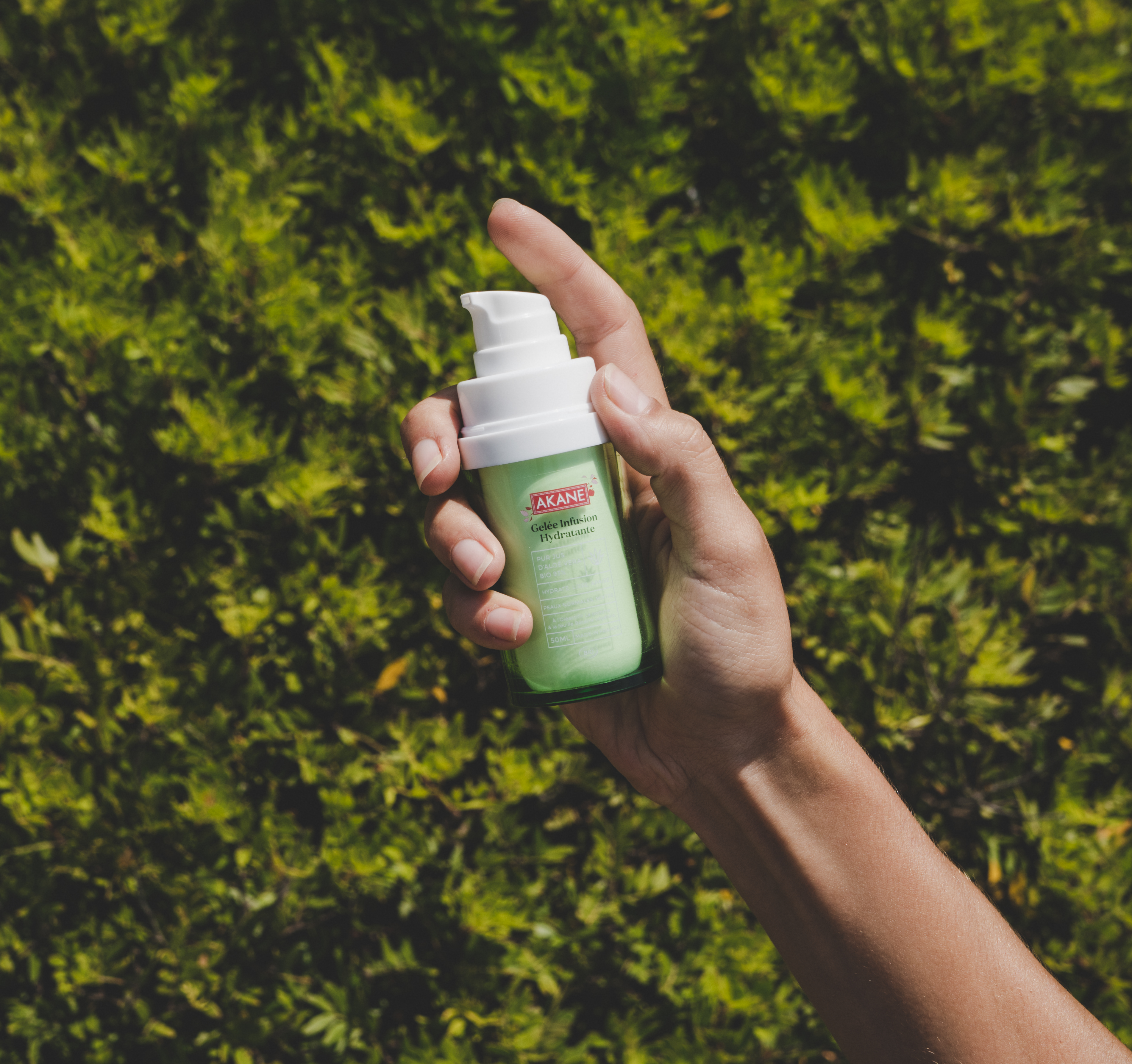Article rédigé par : Aline Foulet
Fondatrice de la marque cosmétique Bio Akane Skincare
Blog Akane

05/11/2019
60 % des femmes et 40 % des hommes pensent avoir la peau sensible. Ce problème dermatologique peut concerner tous les types de peaux, apparaître à tous les âges et se manifester de façon durable ou ponctuelle. Cependant, elle reste difficile à diagnostiquer, alors qu’est-ce qu’une peau sensible ? Comment savoir si vous êtes concerné ? Nous vous expliquons tout dans ce guide spécial peau sensible.
Si vous vous demandez ce qu’est une peau sensible, il faut savoir que ce n’est pas un type de peau, mais plutôt un état cutané. Toutes les peaux peuvent être concernées par cette sensibilité, qu’elles soient grasses ou sèches. Cependant, il semble que les femmes soient plus touchées que les hommes, notamment celles qui ont la peau claire et fine.
La peau sensible est souvent une peau hyper-réactive, qui réagit de façon excessive à des stimuli extérieurs. Cela engendre des démangeaisons, des échauffements, des picotements, des tiraillements ou encore des rougeurs.
Elle est donc intolérante et réagit en excès à des éléments qui n’ont normalement pas d’effets particuliers sur une peau normale. Une peau hyper-réactive possède un seuil de tolérance très bas, et plus il diminue, plus elle réagit rapidement et de manière intense aux agressions. Dans les cas les plus extrêmes, la réactivité de la peau est constante, avec un seuil de tolérance proche de zéro face à tous les éléments (frottements, soins, tabac, hormones, etc.).
Si vous avez la peau sensible, c’est parce que son système de défense ne fonctionne pas correctement. Le film hydrolipidique doit agir comme une barrière protectrice qui empêche les irritants et les bactéries d’atteindre les couches profondes de l’épiderme. Il a aussi pour fonction de retenir l’eau, afin de préserver une bonne hydratation de la peau, qui est indispensable à sa fermeté, à son élasticité et à son confort.
Dans le cas d’une peau sensible, cette barrière est affaiblie et ne peut donc pas assurer une bonne protection face à certains facteurs comme l’humidité, le vent, le chauffage, la climatisation, les agents polluants… L’épiderme se sent alors agressé et envoie des signaux d’alarme qui se traduisent par des rougeurs, des picotements ou des sensations de brûlure. Elle craint davantage les changements d’environnement et les facteurs externes, comme les variations de températures, la pollution, les rayons du soleil, ou une mauvaise routine beauté. Les facteurs peuvent aussi être internes comme le stress, le tabac, une nourriture trop épicée et l’alcool, qui peuvent être à l’origine de et de sensations d’inconfort.
Avec une peau hyper-réactive, les terminaisons nerveuses de la peau sont hypersensibles, ils envoient donc au cerveau des signaux plus intenses que la peau normale. Pour une peau sensible, les facteurs peu agressifs en temps normal sont donc interprétés comme des dangers, ce qui entraîne cette sensation d'inconfort caractéristique.

Maintenant que vous savez-vous qu'est-ce qu’une peau sensible, il est important d’apprendre à en prendre soin. Cela passe notamment par l'utilisation de soins adaptés aux caractéristiques d’une peau hyper-réactive.
Ainsi, en ce qui concerne le nettoyage et le démaquillage, il est recommandé d’abandonner l’eau micellaire trop agressive, qui ne nettoie pas suffisamment en profondeur et dont les tensioactifs altèrent le film hydrolipidique.
Nous vous conseillons de procéder à un triple démaquillage pour un réel nettoyage de la peau. Celui-ci comprend trois étapes :
- Le démaquillage avec notre huile démaquillante qui permet d’enlever le maquillage même s’il est waterproof.
- Le nettoyage de la peau avec la gelée fraîche. Elle élimine toutes les impuretés pour un résultat parfait. De plus, elle est enrichie en pur jus d'aloe vera bio qui a pour effet d’apaiser la peau hyper-réactive.
- L’eau de fleur et de fruit qui révèle l’éclat de votre peau. Elle contient de l’eau florale de rose bio qui élimine les résidus de calcaire, rafraîchit et apaise la peau sensible.
Parfaitement propre, votre épiderme est prêt à recevoir les soins que vous allez lui apporter, et à profiter au maximum des bienfaits de chaque produit. La crème pour peau sensible est indispensable après le démaquillage et nettoyage.
Une crème pour peau sensible doit être riche en huiles végétales, comme l’huile végétale de pépins de courge qui a des propriétés anti-inflammatoires et anti-allergiques intéressantes pour une peau hyper-réactive. Elle va ainsi réduire les rougeurs et les irritations. De même, le beurre de cacao et le beurre de karité conviennent parfaitement à une peau sensible, pour la nourrir et la protéger notamment au niveau des zones les plus sèches. La crème pour peau sensible peut aussi contenir des actifs réparateurs, comme l’huile de macadamia ou l’huile végétale d’avocat qui sont riches en acides gras essentiels. Elles participent à la synthèse du collagène, sont régénérantes et protègent la peau sensible des agressions.
Outre la crème pour peau sensible, au moment de la douche, il est également important d’utiliser un savon pour peau sensible. Vous pouvez alors opter pour un pain dermatologique, un savon surgras ou encore un savon pour peau sensible saponifié à froid. Ce dernier offre tous les bienfaits des huiles végétales et des beurres végétaux qui apportent un nettoyage délicat à votre peau sensible. Ainsi, il inclut uniquement des ingrédients naturels qui ne sont pas nocifs pour la peau, contrairement à ceux d'origine industrielle. Chez Akane, c’est pour cela que nous développons des produits cosmétiques 100 % naturels, pour peau sensible et pour toutes les autres peaux.
Enfin, en ce qui concerne le maquillage, testez les poudres minérales qui sont parfaitement adaptées et qui ont l’avantage de pouvoir camoufler les rougeurs sans les obstruer. Elles apportent une bonne protection face aux agressions extérieures. Fond de teint, mascara et blush doivent faire l'étude d'une surveillance afin de voir comment votre peau y réagit. Scrutez les compositions afin de privilégier les produits plus naturels, de préférence bio.

Un savon pour peau sensible ainsi qu’une crème pour peau sensible sont les soins de base pour réduire la réactivité de votre épiderme. Mais, il faut également adopter de nouvelles habitudes afin de ne pas provoquer de réactions de votre peau sensible. Elle sera moins agressée et donc moins source d’inconfort.
Il est recommandé de ne pas vous exposer aux situations qui favorisent l’apparition des rougeurs, démangeaisons et tiraillements. Évitez autant que possible les endroits pollués et protégez-vous des conditions climatiques extrêmes. La protection solaire est indispensable, encore plus chez une peau sensible et réactive puisque les rayons UVs augmentent les risques de rougeurs et fragilisation des vaisseaux.
De même, un changement peut être opéré concernant votre alimentation. Votre peau sensible a besoin d’aliments riches en oméga 3 et en oméga 6. Ils ont des propriétés anti-inflammatoires mais permettent aussi de fluidifier les tissus, d'assouplir la peau, de bloquer les effets d’une exposition solaire… Ils aident votre peau à rester en bonne santé en la renforçant, pour qu’elle soit protégée contre toutes les agressions. Et, une bonne hydratation de l’épiderme commence par le fait de bien s’hydrater de manière générale. Eau, mais aussi infusions bénéfiques pour la peau sont donc les bienvenues.
Vous connaissez désormais mieux les spécificités de la peau sensible, et la façon dont vous pouvez l’aider avec les bons soins. Une peau chouchoutée sera moins inconfortable, aussi bien grâce à une crème pour peau sensible, qu’avec un ensemble d’habitudes saines et naturelles à conserver sur le long terme.
|
Vous souhaitez des conseils personnalisés pour votre routine beauté ?
|
|

|
Article rédigé par : Aline Foulet Fondatrice de la marque cosmétique Bio Akane Skincare Blog Akane Paris, Montmartre
|